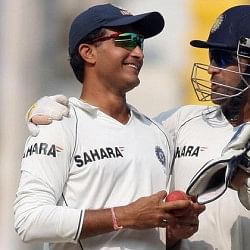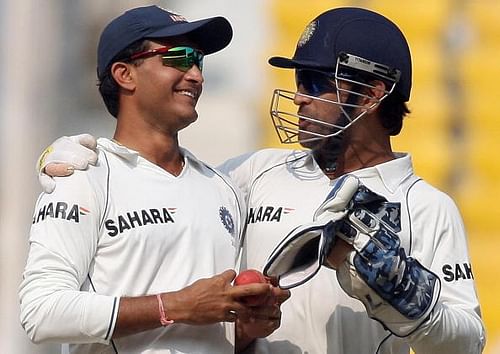
Sourav Ganguly - The significance of the ambitious phoenix

Sourav Ganguly (L) and MS Dhoni
He knew critics were breathing down his neck. He knew that if he failed to perform, he would have to hang his boots permanently. He was also aware that he was well past his prime, his body was not supporting him, and his reflexes had slackened considerably. The year was 2006, the place was South Africa, and the man was Sourav Ganguly.
Ganguly, fondly called as ‘Dada’ by his fans across the country, was committed to come back into the Indian cricket team, after being dropped, and stripped of his captaincy following an ugly spat with the then coach Greg Chappell. He had to prove himself against a merciless battery of pacers on a brutish pitch in hostile conditions. The odds were totally against him. How can someone well past his peak adapt to pace, bounce, and seam movement?
Ganguly batted calmly and naturally. He was tested with the short-pitched stuff and the lethal yorkers. The southpaw responded with steel, solidity, and blazing shots. It was quite clear that he had made vital improvements technically in his game. Ganguly had introduced himself again on the international arena.
Sourav Ganguly’s career can be summarised using 4 C’s – cricket, captaincy, controversies, and comebacks. He was made the skipper of the national team, when Indian cricket had reached its lowest ebb mangled in the soggy gunk of match-fixing. Ganguly rejuvenated the morale of the team and soon made them a force to reckon in overseas conditions.
Ganguly, being a shrewd strategist, coupled with the sagacity of John Wright as the coach of the Indian team, built a squad that forced teams to consider India as a formidable opponent and not a pushover. He inculcated the “Never say die” attitude among players and the “Never lose hope” attitude among fans.
Ganguly was a captain who wore his heart on the sleeve. Be it the infamous episode of Dada removing his shirt and passionately rejoicing India’s victory in the NatWest series of 2002 on the sanctimonious Lord’s balcony or making the great Steve Waugh wait for a toss in a Test Match. He was rebuked by the critics. How can one remove his shirt at Lord’s – the Mecca of Cricket? How dare he make Steve Waugh wait? Only the English reserved the right to celebrate on Indian cricket grounds by removing their shirts, and only Australia had the authority to be insolent, autocratic, and sledge opponents as they were the superpower of cricket.
Certainly these episodes do not suit the code of conduct tacitly expected by the gentleman’s game. But looking from an emotional perspective, he dared to defy the status quo passionately, and revolutionized Indian cricket. After all what is life without passion?